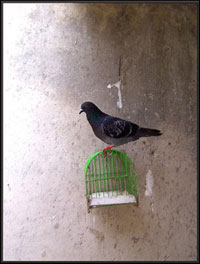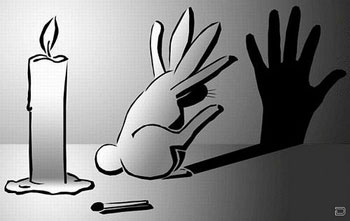
Source: What an irony, .:Piper:., Flickr
Now that you understand how diction and details create tone, it’s time to tackle another device a writer may use to create tone, irony. Often, when you read a story with a surprise twist at the end, the writer has used irony. Irony is found not only in writing, but also in movies, videos, and pictures. Three types of irony are explained in the chart below.
| Situational irony: | A contrast between what a reader or viewer expects and what actually happens |
| Dramatic irony: | When the reader or viewer knows something that a character does not |
| Verbal irony: | When someone knowingly exaggerates or says one thing and means another |

Source: rabbit does human, Go . . . Yourself, Flickr
In this section, we will focus on situational irony.
Sometimes, people mistake unfortunate events for irony. If it rains on your outdoor graduation day, is that an example of irony? No, the rain may dampen the celebration (both literally and figuratively), but it does not fit the criteria for irony because the rain represents an unfortunate event, not an unexpected one. The rain may well be unexpected, but that still does not make it ironic.
Let’s take a look at more situations that may or may not be ironic. Click yes if you agree that the situation is ironic. Click no if you do not think the situation is ironic. (Note: Some of these situations come from Daily Writing Tips.)


Source: Red Christmas present on white
background, Petr Kratochvil, Wikimedia
Some writers use irony when they are attempting to portray the tone of their writing; in fact, “ironic” may be a word you would use to describe a writer’s tone. Irony can be humorous, like someone naming a large dog “Tiny,” or it can be serious. Perhaps you have read the short story “The Gift of the Magi” by O. Henry, which contains an example of irony that’s not humorous.
In this story, a young couple finds they have no money to buy Christmas gifts for each other. They have two prized possessions: Della, the wife, prizes her beautiful, silky, long hair, and Jim, the husband, is quite proud of the pocket watch that once belonged to his father and grandfather. Depressed over their financial situation, Della sells her hair to buy Jim a fob for his watch. Meanwhile, Jim sells his watch to purchase combs for Della’s hair. Exchanging gifts at Christmas, they discover their gifts have been rendered useless.
When you read, keep in mind the three types of irony because, just as a writer’s choice of words and details create tone, so can irony create an ironical tone.